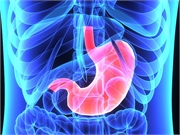Tag: Weight Loss Surgery and Bariatric
Bariatric Surgery May Cut Risk for Colorectal Cancer in Obese Patients
Relative risk for developing colorectal cancer reduced by about 35 percent with bariatric surgery for obesity
Patients Have Less Dyspnea After Bariatric Surgery for Obesity
Dyspnea score change positively linked to air trapping extent change, end-expiratory tracheal shape change
Mental Health Outcomes No Better for Teens Undergoing RYGB
Self-esteem improved after five years in surgical group, but no improvement seen in overall mood
Interventions More Likely After RYGB Versus Sleeve Gastrectomy
Operation, intervention within five years more likely after gastric bypass than after sleeve gastrectomy
Bariatric Surgery May Aid T2DM-Related Outcomes at Five Years
Benefits seen for diabetes remission, weight loss, changes in metabolic parameters
Gastric Sleeve Tied to Lower Risk for Subsequent Procedures
But rates of bariatric conversion, revision procedures higher for gastric sleeve versus gastric bypass
Bariatric Surgery in Teens May Cut Diabetic Kidney Disease Risk
Decreased rates of hyperfiltration, elevated UAE seen among surgically treated obese teens with T2DM
Bariatric Surgery May Raise Risk for Colon Cancer Years Later
Risk increased for colon cancer 10 to 14 years after surgery; no increase in risk found for rectal cancer
Nutritional Deficiencies ID’d in Teens After Bariatric Surgery
Gastric bypass tied to greater nutritional disruption than vertical sleeve gastrectomy
Cancer Risk Halved With Bariatric Surgery-Linked Weight Loss
Hazard ratio 0.44 for incident cancer with loss of at least 20 to 35 versus <20 percent of total body weight














